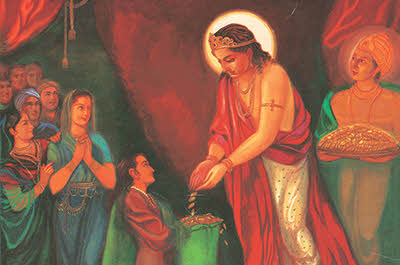
A drum sounded, making the heavens resound with its echoes, and Bards recited: “Hail! O Delight of the World,” etc. The palace, filled with the sounds of song and music and outcries of the Bards, thundered as it were with delight at the arrival of the lord. Then he, like one who had just arisen from sleep, seeing this, wondered: “Is this magic? Is it a dream? Is it illusion? What sort of thing is it? Are the singing, dancing, etc., for my benefit? Are these respectful people here for my benefit as their lord? How did I obtain this abode, luxurious, beautiful, enjoyable, pleasant, the abode of joy?”
With folded hands the door-keeper gently informed him whose doubt was apparent: “Today, O Lord, we are fortunate, having you as our lord. Show favor to us, humble, with your nectar-like glance. O Master, this is the Isana-heaven, granting anything wished for, with great and imperishable glory, always the abode of happiness. In that heaven you now adorn the palace Sriprabha which was gained by your merit. These are your Samanika gods, the ornament of your assembly; with them in the palace you appear like many persons, even though one. These are the Trayastrinsas, O Master the abode of priest and ministership. They await your commands. Instruct them at the proper time. These are the Parisadya gods, the ministers of pleasures. They will divert your mind in assemblies of sport and pleasure. These are your body-guard (atmaraksa), always armed, keen, carrying thirty six weapons, expert in ‘guarding their master. These are the Lokapalas, superintendents of your city-police, and these generals (anikapati) are the chiefs of your army. These Prakirnaka gods are the subjects in the city and country. Your Majesty, they will bear on their heads the purity of your command. The Abhiyogyas, suitable to be used as conveyances by you, serve you here. The Kilbisika gods perform your menial tasks. The palaces, made of jewels, possessing court-yards very beautiful with beautiful young women, giving pleasure to the mind, are yours.
Those tanks are made of jewels and have heaps of golden lotuses. Your pleasure-mountains have ridges of jewels and gold. These pleasure-streams have clear water causing instant delight. These pleasure-gardens have perennial fruit and flowers. This assembly hall of yours, made of gold and jewels, lights up the sky with its brilliance like the sun. These courtesans, who hold chauris, mirrors, and fans in their hands, always have festivals in your service only. This band of Gandharvas is always ready for a concert in your presence, skilled in the use of fourfold musical instruments.”
Employing concentrated attention then from clairvoyant knowledge he recalled his former birth like a day that occurred yesterday as follows: “I was a king of the Vidyadharas and was instructed in the religion of the Jinas by my minister, Svayambuddha, my friend in religion. I fasted as soon as I undertook mendicancy, and as the result of that I have obtained this. Oh, the power of Dharma!” After he had recalled this, he rose and, leaning on the door-keeper’s arm, adorned his throne amidst cries of “Hail! Hail!” that burst forth. Then the gods consecrated him and fanned him with chauris, and the Gandharvas sang to him with songs, sweet and auspicious. His mind filled with devotion, he arose and went to the temple, and worshiped the eternal images of the Arhats. He sang manifold hymns of praise to the Lord of Jinas, while auspicious songs with a sweet rendering of the three scales were sung by the gods. Then he read aloud the sacred books, lamps of knowledge, and worshiped the Arhats bones placed on pillars in the pavilion. Then, shining with a divine umbrella that was like a full moon carried (over him), he went to the pleasure-house.
There the lord of Sriprabha, greatly delighted, saw a goddess, Svayamprabha by name, who surpassed the lightning in radiance. She was like a bed of lotuses in a river of loveliness under the guise of exceedingly tender feet, hands, eyes, and face. She had round and tapering thighs like Puspadhanvan’s quivers that had been deposited. She was adorned with broad hips clothed in white, like a river with a sandy beach covered with groups of kalahansas. She looked like the middle part of a thunderbolt with her waist very slender as if from carrying the weight of her high, swelling breasts. She shone with a neck that had three folds, and a deep voice announcing the great victory of King Love as if by a conch. She was adorned with lips that surpassed the bimba (in redness), and with a nose that had the beauty of the stalk of the eye-lotuses. She stole away the heart by her lovely smooth cheeks and forehead that stole the wealth of the Laksmi of the full moon divided. She had ears that were thieves of the grace of Ratipati’s pleasure-swing, eye-brows that stole the beauty of Smara’s bow. She was decorated with a braid of hair that had the glossy beauty of Collyrium, that was like a circle of bees following her lotus-face. From the wealth of jeweled ornaments on her body, she gave the impression of a kalpa-creeper endowed with motion. She was entirely surrounded by thousands of charming lotus-faced Damsels, like the Gangas by rivers. When he was far off, she rose to do him honor with wonderful affection, and the Chief of the gods seated himself with her on a couch. Seated together, they looked like a tree and a creeper in one basin of water. Their hearts were always united by mutual love, as if bound by a firm chain.
Enjoying himself with her, having the fragrance of unbroken love, he passed a long time like a moment. Then Svayamprabha fell from heaven like a leaf from a tree. For when age-karma has expired, even Indra cannot remain. Lalitanga swooned from grief at his wife’s fall, as if he had been crushed by a mountain, or struck by a thunderbolt. When he had regained consciousness, he immediately began to wail again and again, making the palace Sriprabha wail with echoes. He did not find pleasure in a garden; he was not refreshed in a water pool; he was not happy on a pleasure-mountain, and he did not delight in Nandana. Wailing, “Oh, my Love, where are you? Where are you, my love?” he wandered everywhere, seeing everything as Svayamprabha.











No comments yet.
Leave a comment